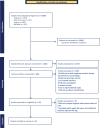Ultra-Processed Food Intakes and Health Outcomes in Adults Older Than 60 Years: A Systematic Review
- PMID: 39890099
- PMCID: PMC12343033
- DOI: 10.1093/nutrit/nuae223
Ultra-Processed Food Intakes and Health Outcomes in Adults Older Than 60 Years: A Systematic Review
Abstract
Context: Relationships between ultraprocessed food (UPF) intakes and health have been well described in adults, but evidence of these relationships in older adults is rather limited. Demographic shifts in aging emphasize the importance of understanding the role of diet in maintaining health during later life.
Objective: The aim of this systematic review was to identify health outcomes associated with UPF consumption in those aged ≥60 years.
Data sources: The Medline, Web of Science, Scopus, and Embase databases were searched from inception until June 2023, using search terms representing UPF and any health outcome. Observational studies restricted to individuals aged ≥60 years using the Nova food classification were included. Articles were screened independently by 2 researchers using PECOS inclusion criteria.
Data extraction: Two-thirds of the studies in the present review were prospective cohort studies (n = 4) and the rest were cross-sectional (n = 2). The number of participants ranged from 652 to 2713 across the 6 studies. The mean age of participants ranged between 67 and 73 years.
Data analysis: In the prospective cohort studies, the highest consumption of UPF was associated with incident frailty, incident dyslipidemia, renal function decline, and abdominal obesity. For cross-sectional studies, the highest intake of UPF was associated with negative outcomes similar to young and middle-aged cohorts, with the addition of nutritional frailty and worse cognitive performance.
Conclusions: Currently, the limited understanding of how high UPF intakes could be associated with negative health outcomes for older adults influences the ability to inform policy and practice recommendations. More research is required owing to the very limited number of studies, specifically in older adults.
Systematic review registration: PROSPERO registration no. CRD42023442783.
Keywords: Nova food classification; food processing; observational study; older adults; ultra-processed food.
© The Author(s) 2025. Published by Oxford University Press on behalf of the International Life Sciences Institute.
Conflict of interest statement
A.W.W. has received unrestricted research funds from food industry organizations and the UK Research and Innovation (UKRI). T.R.H. has received research funding from various UKRI sources and university-administered consultancy and research from Noble Foods Ltd, has served on committees for the Royal Osteoporosis Society, currently serves as the Honorary Treasurer ad Trustee of the UK and Ireland Nutrition Society, and is a director of Cambridge Court Enterprises, the trading company of the Nutrition Society. These disclosures are provided for transparency, though none of the funding sources or roles relate to the present research work and article.
Figures
References
-
- World Health Organization. Global Strategy and Action Plan on Ageing and Health. World Health Organization; 2023. Accessed December 25, 2023. https://www.who.int/publications/i/item/9789241513500
-
- Saunders J, Smith T, Stroud M. Malnutrition and undernutrition. Medicine. 2011;39:45-50. 10.1016/j.mpmed.2010.10.007 - DOI
Publication types
MeSH terms
Grants and funding
LinkOut - more resources
Full Text Sources


